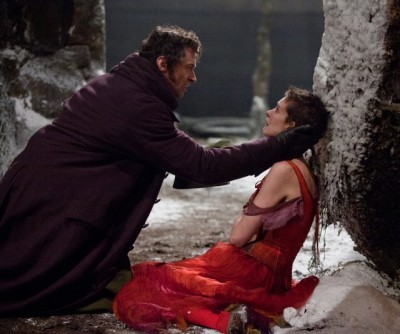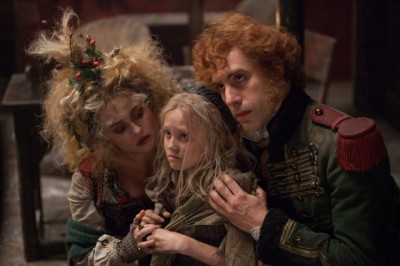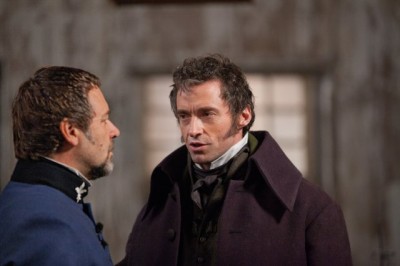
My suspicion is that if you are a fan of the stage show of Les Miserables, you’re probably going to be keener on Tom Hooper’s film version than I am. Quite honestly, I didn’t like it — I didn’t like it a lot. I think a good bit of the problem stems from the source material. It doesn’t work for me or on me. I cannot — try as I may — remember a note of the music. It’s all one undistinguished and indistinguishable mass. I even saw the movie twice to see if that helped matters on that or with any other score. It didn’t. I was more disappointed than annoyed because I wanted to like this. After all, by and large, I like musicals and I like Tom Hooper (particularly his The Damned United and The King’s Speech). Normally, I like Hugh Jackman and Anne Hathaway. By rights, I really ought to like this movie. Unfortunately, I found it humorless (yes, I know it’s called Les Miserables, but did it have to include the audience?), unaffecting and absolutely interminable. It was like the dramatic equivalent of Mamma Mia! (with less catchy songs), but where that film kept screaming at me to have a good time, this one wanted to bludgeon me with how serious and important it was — to the point that I laughed at several inappropriate points. (When one character who died early on popped up about 20 reels later, I was much amused, which wasn’t the idea.)

While I have nothing against operatic filmmaking, Hooper has pitched the whole film in what might be called bombastic overkill. It starts on an absurdly oversized note — with Jackman’s Jean Valjean and a bunch of other convicts bellowing while pulling a ship into its berth — and stays there. It’s not enough that there’s plenty of manpower here to build the pyramids. Oh, my, no—computerized swooping cameras, spraying water and CGI trickery are all working overtime to sell this as spectacle. I suppose it works on some level, but it all seems like so much effort to get to any real point. It’s big for the sake of being big, but whether it’s impressive or simply oppressive in its sheer lumbering, elephantine plodding is another matter. However, if you are impressed by this, you’ll likely feel the same about the rest of it — because it’s not unlike the rest of its 157 minutes.

Much has been made — especially by the director — of the film’s use of live recording, which is hardly the big breakthrough it’s been painted to be. Musicals are normally recorded first and then acted out to a playback. There’s a reason for this: It works. The earliest musicals were done live, but that was primarily a technical consideration, not an aesthetic one. There are exceptions. Frank Capra’s Riding High (1950) used live recording, but the songs and stagings were off-the-cuff and simple. One of the numbers in Alan Parker’s Evita (1996) was recorded live. Most famously, Peter Bogdanovich’s career-crippling At Long Last Love (1975) used the technique. The idea in Hooper’s case was to preserve the immediacy of the performances. Does it? Perhaps, but whether it’s a good thing is a separate consideration. It tends to prompt the director to crowd his camera in on the hard-working performer — and their pitched-to-the-back-row efforts are often distractingly palpable. Big close-ups of Jackman with the veins bulging out of his head like he’s courting an aneurysm feel less like emoting and more like the actor straining to hit those notes. Anne Hathaway fares better, but Russell Crowe merely seems uncomfortable.

It’s all coated in high-gloss romanticized poverty, jittery hand-held camerawork and admittedly occasionally striking images (usually at the beginning or ending of a scene). How you’ll respond to the basic story of Jean Valjean being hounded (somewhat preposterously) by Inspector Javert (Crowe) — with infusions of subplots and a veneer of French history — probably goes back to Victor Hugo’s book, or at least the stage show. It requires considerable suspension of disbelief — from the mystifying presence of Cockney accents for the lower classes to the convenience of Javert’s appearances — that I couldn’t muster. And it’s all so very earnest and important. (Thank goodness, Sacha Baron Cohen and Helena Bonham Carter enliven things with good natured villainy.) You may get more out of it than I did — you could hardly get less — but if I want dramatized French history tarted up with songs, I’ll take Peter Brook’s Marat/Sade (1967). Rated PG-13 for suggestive and sexual material, violence and thematic elements.
Playing at Carmike 10




Your review + trailers = boring film.
As an aside, I had forgotten about ‘At Long Last Love’ until reading your reference to it. I made my first trip to NY City shortly after that film was released, and actually saw it premier at Radio City Music Hall. I remember thinking something like “all the way from Virginia to the Big Apple and THIS is what is playing?”
The Rockettes were much better.
I admit I have a guilty fondness for At Long Last Love — in part, I suspect, for my memories of watching the massive walkouts in 1975. I’d never seen a reaction like it. Actually, I’ve never seen another one like it. But, hey, at least it was full of memorable tunes! That’s where a lot of my problem with this is. I don’t like the music. That’s why I suspect people who do will like it.
I could not identify one tune from that film if my life depended on it. And had I not seen it in the setting I did, I would probably not remember it at all.
Considering they’re all Cole Porter standards, you’d probably recognize them, even if you don’t associate them with this movie.
from the mystifying presence of Cockney accents for the lower classes
I don’t see why this is mystifying. Films have been using British accents as stand ins for French accents for years.
Didn’t Michael Caine play a French Nazi war criminal in something a few years ago?
Hugo also used British accents for French.
I don’t know, it seemed ludicrous to me to have this Cockney French street urchin.
The reason the film tries to be big, epic, etc is because the stage version is massively popular (I’ve seen it twice in both the original version and the restaged 25th anniversary version and greatly enjoyed both) and Cameron Mackintosh has been trying to do a film almost since the stage version premiered. Since this is likely the one ond only film we’re going to see of it, the mindset was probably “We’ve got one chance, don’t blow it”. I’m sorry the story doesn’t appeal to you, but I think you are right that fans of the show will love it. To each his own.
I certainly hope this is the only film version we’re ever likely to see.
Hugo also used British accents for French.
True, though it established that right at the start and never made an issue of it. But the big thing is Hugo had no one pop in part way through who came across like he’d just wandered in from a touring company of Oliver!.
Although I liked this movie a lot more than Ken did, I also found the street urchin’s cockney accent to be very annoying but it’s on the Original Cast recording from 1985. I believe that Cameron Macintosh deliberately wanted to remind Londoners of OLIVER in order to guarantee success.
It should be noted that LES MIZ began life as a French concept album similar to JESUS CHRIST SUPERSTAR. It was Macintosh, fresh from the success of CATS, who turned it into a West End stage musical. It opened to considerably less than stellar reviews but the public flocked to it and the rest as they say…is history.
I would say that its similarity to Jesus Christ Superstar begins and ends with having first appeared as an album, but then I like Superstar.
I suppose I should be thankful that Gavroche didn’t make me think of Eddie Hodges/Ronnie Howard singing about the Wells Fargo wagon coming down the street.
The original French album (which I have) is as different from the stage show and movie as the original SUPERSTAR album is from Tom O’Horgan’s Broadway show and Norman Jewison’s film.
I’m satisfied to take your word. My point is that I suspect it isn’t actually similar to Superstar in any musical sense. Certainly, the movie isn’t. And presumably the songs are the same.
I would say that its similarity to Jesus Christ Superstar begins and ends with having first appeared as an album, but then I like Superstar.
Funnily enough, I have precisely the problem with JCS that you have with Les Mis – none of the songs made any impression on me.
I’ve seen the movie version and a production a couple of years ago and can’t recall a single melody line or lyric.
Whereas with Les Mis, my only exposure to it was a production I saw three years ago – and I could still sing a good four or five songs from the show if required.
I could still sing a good four or five songs from the show
Please don’t. There’s money in it for you if you don’t.
“Good-natured villainy”. Therein lies the reviewer’s pathos. The reason why he disliked the film. The reason why he didn’t cry. The reason why the music didn’t find the slightest scent of blood in his heart. This a review from a man who thinks human pity is a weakness. A Nietzschean failure of a man. The review isn’t inherently terrible, but terrible because it’s written from someone who’s probably inherently bad. But don’t worry, his badness is “good-natured”…
They chose cockney accents for the street urchins because cockney sounds rough and gritty. It has more of an effect than american accents. (The accents made you feel uncomfortable, therefore they got their message across!). Also, singing it live is a GREAT choice. I am an actor myself, and you can make so many acting choices when singing live. Otherwise, they would have to make their acting choices three months before shooting the film! And I really do not understand how you can’t remember any of the tunes, lyrics, melodies, or notes. The first time I saw the musical, the songs stuck with me and pierced deep into my heart. However, I think the biggest mistake with this movie is how they try to aim it at general audiences, when truly the only people able to appreciate it enough(as exhibited in this article and comments) are fans of the musical. I personally love Les Miserables because of the music, the story, and the message.
“Good-natured villainy”. Therein lies the reviewer’s pathos. The reason why he disliked the film. The reason why he didn’t cry. The reason why the music didn’t find the slightest scent of blood in his heart. This a review from a man who thinks human pity is a weakness. A Nietzschean failure of a man. The review isn’t inherently terrible, but terrible because it’s written from someone who’s probably inherently bad. But don’t worry, his badness is “good-natured”…
Wow. Just wow. This is perhaps the craziest extrapolation I’ve ever read on this site. (That’s saying a good bit.) And you arrived at this because I referred to characters who are clearly meant to be comic relief as engaging in “good-natured villainy?” Amazing. But I think it’s kind of chic to be called “A Nietzschean failure of a man.”
They chose cockney accents for the street urchins because cockney sounds rough and gritty.
You’re saying this was a deliberate choice? Has that been actually stated by the filmmakers or the producers of the stage show?
The accents made you feel uncomfortable, therefore they got their message across!
First of all, I can’t understand why they would want to have Gavroche make me uncomfortable. But it wasn’t that it made me uncomfortable, it’s that it took me right out of the story.
Also, singing it live is a GREAT choice.
You’ve seen it then?
I think the biggest mistake with this movie is how they try to aim it at general audiences, when truly the only people able to appreciate it enough(as exhibited in this article and comments) are fans of the musical.
Well, they clearly wanted to appeal to the broadest audience, which is understandable. What I’m waiting to see are responses from people who — like me — had their first exposure to this material from watching this film — without having a predisposition toward it from seeing it onstage or even listening to the OCR. Right now, so far as I know, every remark has come from people already sold on the material. And, for that matter, the only one I know for a fact has seen the movie is Chip.
What I’m waiting to see are responses from people who — like me — had their first exposure to this material from watching this film — without having a predisposition toward it from seeing it onstage or even listening to the OCR.
That’s me. Nick’s summation of the songs’ power is accurate and their impact was amplified by the live singing. The style reminded me of SWEENEY TODD, which I also enjoyed.
What I’m waiting to see are responses from people who — like me — had their first exposure to this material from watching this film — without having a predisposition toward it from seeing it onstage or even listening to the OCR. Right now, so far as I know, every remark has come from people already sold on the material. And, for that matter, the only one I know for a fact has seen the movie is Chip.
It’s going to be tough making this one a priority with Django and Playbook arriving- and having not made it out to see Hitchcock yet. But really I just must know if Ken truly earned the “Nietzchean failure of a man” flag that he’s been waving with flattered amusement these past couple days.
If I do make it out to Les Miserables it will be without having ever read the novel, seen a stage production, or been exposed to the music in any way that I’m aware of.
The style reminded me of SWEENEY TODD, which I also enjoyed.
It didn’t remind me of Sweeney Todd. At all.
I just must know if Ken truly earned the “Nietzchean failure of a man” flag that he’s been waving with flattered amusement these past couple days.
Hey, I only got called it this afternoon, so I can’t have been waving it around for a couple of days!
If I do make it out to Les Miserables it will be without having ever read the novel, seen a stage production, or been exposed to the music in any way that I’m aware of.
Well, I had seen a couple of straight movie versions before, so I might be a little up on you there.
I think the biggest mistake with this movie is how they try to aim it at general audiences, when truly the only people able to appreciate it enough(as exhibited in this article and comments) are fans of the musical.
Having not seen the film, I can’t really comment on this, but surely if a film can only be appreciated by fans of the source material, it isn’t much of a film. I say that as a fan of the source material.
Can the musical only be truly appreciated by fans of the novel?
I’m impressed! A letter from “JC” himself. Who else would know what a “Nietzchaen failure of a man” would be. And this after Ken even said he preferred SUPERSTAR to LES MIZ. That’s gratitude for you.
Gratitude indeed! The Old Boy better not show up here on Christmas Eve expecting to split a cheese log and a glass of egg nog with me is all I can say.
And this after Ken even said he preferred SUPERSTAR to LES MIZ. That’s gratitude for you.
To be fair, JC doesn’t come off that well in SUPERSTAR.
Well, he gets it in the end, but that’s the way the story goes.
One must never run out of Nietzsche.
I think you should just be happy that it didn’t run 240 minutes, being a French play and all. They do love to beat it to death. Maybe next they can do a musical “Madame Bovary”.
I don’t know but the whole idea of a musical “Les Misreables” seems sort of ludicrous like Terry Gillham might have had a hand in it. Er, but then it would be entertaining. Never mind.
Maybe I’ll find out on DVD about the same time they release “The Hobbit”. Certainly my movie going dollars aren’t being spent on either of those.
Pardon me for now. I’ve got to go shopping because our bathroom has only one roll of Nietzsche left.
It actually seems kind of appropriate that this opens today, as anyone miserable enough to want to spend Christmas Day in a cinema instead of with their family probably would appreciate a somber romp through poverty, death and unrequited love.
You’re Australian, you don’t understand. You take the family to the movies in a gang.
I think the Michael Phillips qoute was “Ken Russell would have come out of the grave and said enough, enough”.
Actually I more readily hear Ken saying, “And that Javert — ick!” or “You’re boring me.”
I finally got around to seeing this. I can’t recall disliking a movie quite so much in many years. To paraphrase some critic I saw on television when it was first released, it did feel kind of like the face-hugger from ‘Alien’ latching on for two-plus hours, only to have it drop off as end credits unfold.
I wonder who told these people they could sing? Maybe Anne Hathaway has a good voice (for those who can stand her), but the others?
You can’t blame me. I certainly didn’t recommend it.
“You canТt blame me. I certainly didnТt recommend it.”
No, you did not recommend it, thank goodness. In fact, you gave fair warning.